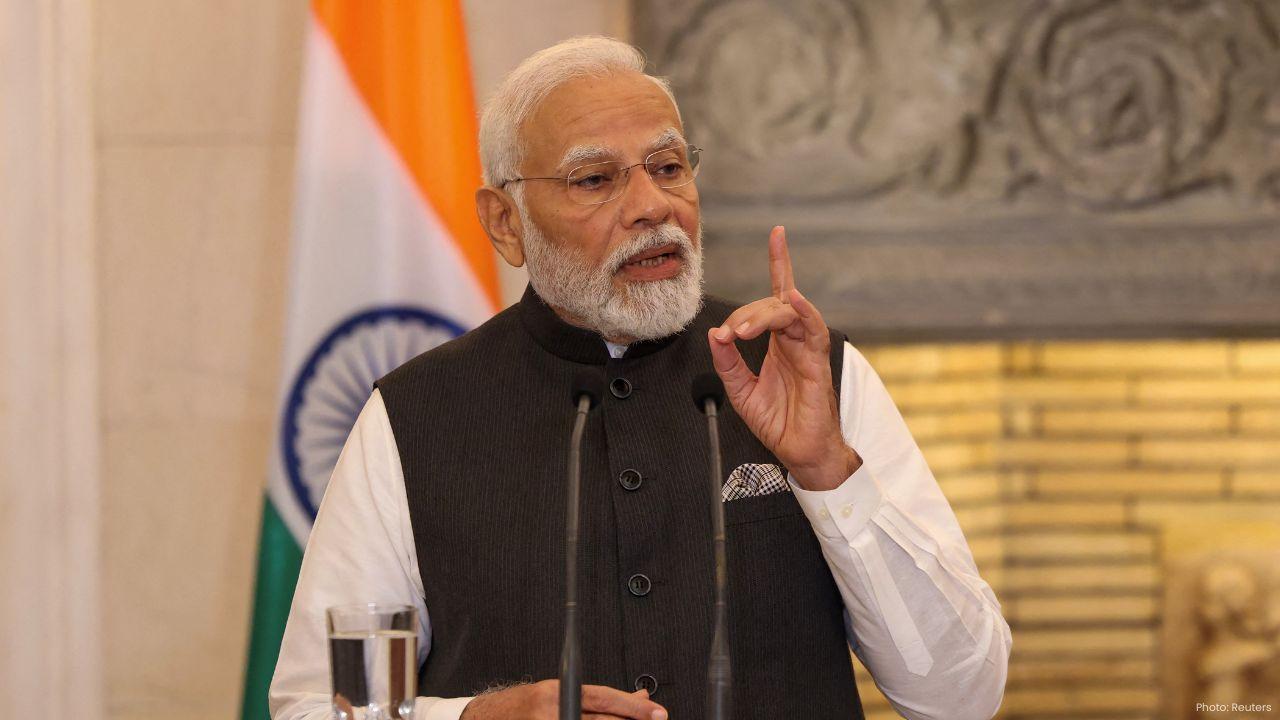
Post by : Avinab Raana
Photo : X / uncle deng
Google has announced a sweeping £5 billion investment into the United Kingdom, timed to precede the upcoming state visit by U.S. President Donald Trump. The decision demonstrates strong confidence in the UK’s tech economy and reflects growing momentum for AI and clean energy development. It also aligns with the government’s efforts to revitalize investment flows and support job creation amid global economic uncertainty.
A central piece of Google’s investment is the opening of a major new data centre near London. This facility is designed to support the rising demand for Google’s cloud-based services such as Google Cloud, Search, Maps, and Workspace. The data centre will serve as a hub for AI-related operations, underlining Google’s intention to anchor cutting-edge infrastructure in the UK rather than just shipping data in from abroad.
With this move, Google expects to generate around 8,250 jobs annually through its operations, service partnerships, construction, and local supply chains. That number includes both direct employees and roles in supporting industries. For the UK government, this announcement is being seen as a “powerful vote of confidence” in the economy, especially at a moment when attracting foreign investment is a political priority.
Google has committed that its UK operations will reach about 95 percent carbon-free energy by 2026. Key to this ambition is a partnership with Shell to support grid stability and energy transition in Britain. The new data centre near Waltham Cross will feature air-cooling technology to reduce water usage and will reuse the facility’s heat in nearby homes or businesses. These measures are intended to reduce environmental impacts, aligning the project with sustainability goals.
The timing of Google’s announcement is clearly linked to President Trump’s state visit. As political leaders in the UK seek to showcase strong economic ties with the U.S., large investments like this carry symbolic weight. The announcement is expected to be one of several business and energy deals revealed during the visit, reinforcing the narrative of a deepening U.S –UK partnership in technology and clean energy fields.
UK Finance Minister Rachel Reeves described Google’s investment as an endorsement of the U.S.–UK relationship and a boost for the UK economy. Prime Minister Keir Starmer’s administration has made courting foreign investment a central part of its economic strategy. The announcement helps demonstrate that strategy bearing results, especially in high-tech sectors like AI, cloud computing, and data services.
Large-scale data centres have high energy demands, and ensuring that power supply is clean, reliable, and scalable is a significant challenge. Google’s deal with Shell is intended to help address issues of energy storage and grid flexibility. Using technologies like air cooling and heat re-use points to an attempt to manage resource use responsibly. Still, questions remain about how the local grid will cope with ramped-up demand and whether other infrastructure will need upgrades.
While the sustainability features are promising, there are concerns among environmental groups about the cumulative impact of large data centres. The water usage, land use, and power demands can place pressure on local resources. The effectiveness of heat reuse and carbon-free energy claims will be closely watched. Ensuring that these projects truly meet sustainability targets will be important both for public acceptance and regulatory support.
This investment positions the UK more prominently in the global AI infrastructure map. With large firms expanding capacity, data centres become critical infrastructure not just for commercial services but for innovation, AI training, and cloud computing. Having these data centres on UK soil helps reduce latency, data transfer costs, and may give British businesses and researchers advantages in developing AI applications.
Jobs will come not only in building and maintaining centres but in the broader ecosystem of suppliers, service providers, and local businesses that benefit from increased economic activity. Local communities near the Waltham Cross centre, for example, may see opportunities in construction, maintenance, utilities, and hospitality. There are also potential downstream benefits: technologies, skills, and innovation capacity built up by Google may spill over to other firms.
Projects of this scale often face planning, permitting, and regulatory reviews. Zoning, environmental impact assessments, water licensing, noise, and traffic are among the issues that need managing. Google’s sustainability pledges may help smooth those processes, but no large investment is without obstacles. Local councils, regulators, and residents will likely ask for transparency about the full environmental cost and assurances about mitigation.
Some of the risks for Google include cost overruns, delays in regulatory approval, and infrastructure constraints. Another risk is that rising energy prices or supply constraints could cut into promised carbon-free margins. Public concern or environmental opposition could also slow things down. For the UK government, overreliance on large tech investments could heighten vulnerabilities if global tech sentiment shifts or investment slows.
The UK has been working to deliver stronger economic performance after periods of slowdown. Attracting foreign tech investment fits into the strategy to raise productivity, foster innovation, and create high-skill jobs. With competition from other European nations, and global powerhouses offering incentives, securing major investments like this signals that Britain remains competitive. For tech companies, proximity to markets, regulatory regimes, and green energy availability are increasingly deciding factors.
Observers will be watching whether Google meets its 2026 target of ~95% carbon-free operations. Also, how the grid responds, whether the Shell partnership delivers on promises, whether job creation goals are met, and whether additional planning permissions are granted smoothly. It will be important to see follow-on announcements: how much of the investment goes into AI R&D, training, or supporting infrastructure beyond just data centres.
Google’s £5 billion investment is more than just a financial commitment. It is a signal of long-term confidence in the UK economy, technology sector, and the ability to grow sustainably. The mix of AI infrastructure, green energy ambition, and job creation positions the move as strategic for both Google and Britain.
As President Trump’s state visit unfolds, this deal underscores the value of international cooperation in tech and clean energy. If the promises on sustainability and economic impact are realized, the investment could serve as a model for how large tech firms can work with governments to generate growth while aiming for environmental responsibility.
The real test will be in whether these ambitious plans actually translate into outcomes: real jobs, genuine carbon savings, reliable infrastructure, and measurable benefit to communities. If they do, this may signal a turning point in how the UK balances cutting-edge technology, foreign investment, and sustainable energy.
Google investment UK, AI data centre, Carbon-free energy










Bengaluru-Mumbai Superfast Train Approved After 30-Year Wait
Railways approves new superfast train connecting Bengaluru and Mumbai, ending a 30-year demand, easi

Canada Post Workers Strike Halts Nationwide Mail and Parcel Services
Canada Post halts operations as CUPW strike disrupts mail and parcel delivery nationwide amid disput

PM Modi Launches BSNL ‘Swadeshi’ 4G Network, 97,500 Towers Built
India enters global telecom league as PM Modi inaugurates BSNL’s indigenous 4G, connecting 26,700 vi

India’s Iconic MiG‑21 Takes Final Flight After Six Decades of Service
After 60 years India retires its MiG‑21 fighter jet, a legendary yet controversial warplane marking

Hindustan Zinc unveils AI hotspot monitoring at Debari smelter
Hindustan Zinc launches AI-powered Switchyard Hotspot Monitoring at Debari smelter to cut outages bo

Chinese experts worked inside sanctioned Russian drone plant
Chinese drone specialists visited IEMZ Kupol supplying parts and drones via intermediaries, deepenin